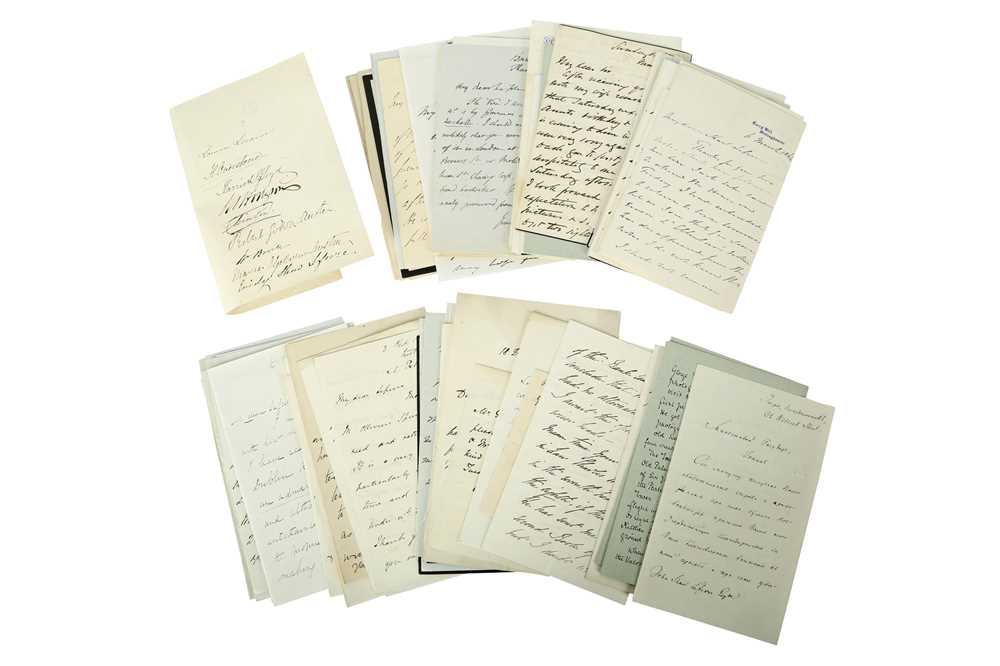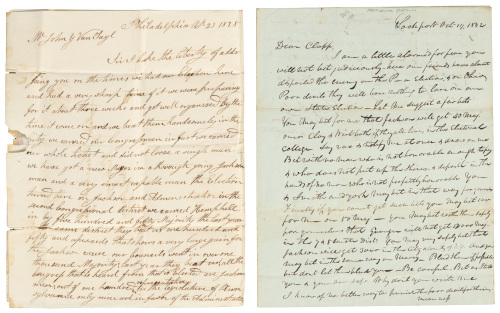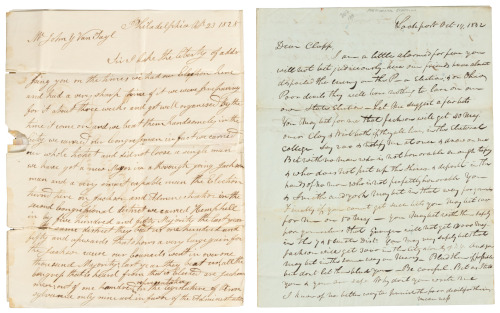LAW, John (1671-1729). Two autograph letters signed ('Law') to an unidentified recipient [Louis Henri, Duc de Bourbon (1692-1740)]), Venice, 24 January and 1 March 1721. In French, together 3½ pages, 289 x 205mm and 260 x 190mm, on bifolia, the first docketed by recipient. Autograph letters from Law after his fall, pleading for some return of influence and prosperity: 'I am the enemy of no one'. In the first, Law expresses deep gratitude for a letter written by the Duke to M. de Chavigny, whom Law has seen and who has spoken to him of it [the French diplomat Théodore Chevignard, chevalier de Chavigny, was a friend of Law's but also an ally of his powerful opponent Cardinal Dubois]. He goes on: 'les absens principalement ceux de mon espece n'ont que peu d'amis, en revenge je ne suis ennemi de personne. Je souhaitte a tous ceux qui servent le regent succes dans leur ministere.. [Exiles, especially those of my sort, have few friends, and yet I am nobody's enemy. I wish success in their ministry to all those who serve the regent]'. In the second letter, Law makes a plea for some restoration of his personal finances: 'I have just written to the regent about my personal affairs. Mme Law [i.e. Law's common-law wife, Katherine Knowles] will have the honour to pass the letter to Your Serene Highness and I beg you to be so kind as to give it to His Royal Highness [i.e. the Regent]. You may be assured that I have no possessions abroad: if I had I would not take the trouble to write a letter to increase them. I beg Your Serene Highness to continue your goodness and protection towards me'. The recipient, the Duc de Bourbon, is a key player in Law's rise and fall, and made two crucial interventions on his behalf, first lobbying for his reappointment after his initial dismissal from office on 29 May 1720, and then arranging for his safe passage from France after his definitive fall in December 1720. In the early months (and even years) of his exile, Law did not altogether abandon hope of a recall to France, and his eager gratitude for Bourbon's recommendation of him to Chavigny should be seen in this context. Law's system had brought its architect extraordinary wealth -- in the letter to the Regent referred to here, he mentions the value of his Mississippi shareholdings having reached 100 million livres in 1720; there were widespread rumours, which Law attempts to scotch here, that he had managed to secure extensive assets outside France, but in reality the collapse of his system ruined him and he was to live out his last years between England and Italy, dying in poverty in Venice on 21 March 1729. Ironically, the Duke of Bourbon was himself enormously enriched by the Mississippi scheme, and escaped its collapse unscathed. According to ABPC/Rare Book Hub online, no autograph letter by Law has previously been offered at auction.
LAW, John (1671-1729). Two autograph letters signed ('Law') to an unidentified recipient [Louis Henri, Duc de Bourbon (1692-1740)]), Venice, 24 January and 1 March 1721. In French, together 3½ pages, 289 x 205mm and 260 x 190mm, on bifolia, the first docketed by recipient. Autograph letters from Law after his fall, pleading for some return of influence and prosperity: 'I am the enemy of no one'. In the first, Law expresses deep gratitude for a letter written by the Duke to M. de Chavigny, whom Law has seen and who has spoken to him of it [the French diplomat Théodore Chevignard, chevalier de Chavigny, was a friend of Law's but also an ally of his powerful opponent Cardinal Dubois]. He goes on: 'les absens principalement ceux de mon espece n'ont que peu d'amis, en revenge je ne suis ennemi de personne. Je souhaitte a tous ceux qui servent le regent succes dans leur ministere.. [Exiles, especially those of my sort, have few friends, and yet I am nobody's enemy. I wish success in their ministry to all those who serve the regent]'. In the second letter, Law makes a plea for some restoration of his personal finances: 'I have just written to the regent about my personal affairs. Mme Law [i.e. Law's common-law wife, Katherine Knowles] will have the honour to pass the letter to Your Serene Highness and I beg you to be so kind as to give it to His Royal Highness [i.e. the Regent]. You may be assured that I have no possessions abroad: if I had I would not take the trouble to write a letter to increase them. I beg Your Serene Highness to continue your goodness and protection towards me'. The recipient, the Duc de Bourbon, is a key player in Law's rise and fall, and made two crucial interventions on his behalf, first lobbying for his reappointment after his initial dismissal from office on 29 May 1720, and then arranging for his safe passage from France after his definitive fall in December 1720. In the early months (and even years) of his exile, Law did not altogether abandon hope of a recall to France, and his eager gratitude for Bourbon's recommendation of him to Chavigny should be seen in this context. Law's system had brought its architect extraordinary wealth -- in the letter to the Regent referred to here, he mentions the value of his Mississippi shareholdings having reached 100 million livres in 1720; there were widespread rumours, which Law attempts to scotch here, that he had managed to secure extensive assets outside France, but in reality the collapse of his system ruined him and he was to live out his last years between England and Italy, dying in poverty in Venice on 21 March 1729. Ironically, the Duke of Bourbon was himself enormously enriched by the Mississippi scheme, and escaped its collapse unscathed. According to ABPC/Rare Book Hub online, no autograph letter by Law has previously been offered at auction.
.jpg)
.jpg)







.jpg?w=400)




.jpg)
Testen Sie LotSearch und seine Premium-Features 7 Tage - ohne Kosten!
Lassen Sie sich automatisch über neue Objekte in kommenden Auktionen benachrichtigen.
Suchauftrag anlegen